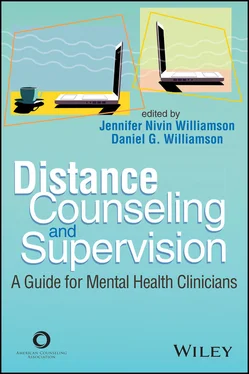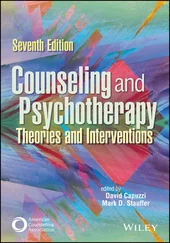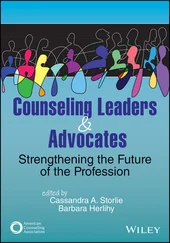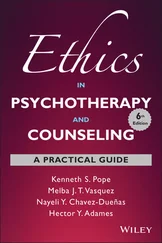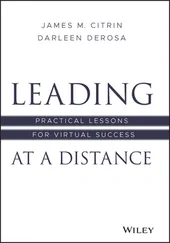Distance Counseling and Supervision
Здесь есть возможность читать онлайн «Distance Counseling and Supervision» — ознакомительный отрывок электронной книги совершенно бесплатно, а после прочтения отрывка купить полную версию. В некоторых случаях можно слушать аудио, скачать через торрент в формате fb2 и присутствует краткое содержание. Жанр: unrecognised, на английском языке. Описание произведения, (предисловие) а так же отзывы посетителей доступны на портале библиотеки ЛибКат.
- Название:Distance Counseling and Supervision
- Автор:
- Жанр:
- Год:неизвестен
- ISBN:нет данных
- Рейтинг книги:5 / 5. Голосов: 1
-
Избранное:Добавить в избранное
- Отзывы:
-
Ваша оценка:
- 100
- 1
- 2
- 3
- 4
- 5
Distance Counseling and Supervision: краткое содержание, описание и аннотация
Предлагаем к чтению аннотацию, описание, краткое содержание или предисловие (зависит от того, что написал сам автор книги «Distance Counseling and Supervision»). Если вы не нашли необходимую информацию о книге — напишите в комментариях, мы постараемся отыскать её.
*To purchase print copies, please visit the ACA website here
*Reproduction requests for material from books published by ACA should be directed to permissions@counseling.org
Distance Counseling and Supervision — читать онлайн ознакомительный отрывок
Ниже представлен текст книги, разбитый по страницам. Система сохранения места последней прочитанной страницы, позволяет с удобством читать онлайн бесплатно книгу «Distance Counseling and Supervision», без необходимости каждый раз заново искать на чём Вы остановились. Поставьте закладку, и сможете в любой момент перейти на страницу, на которой закончили чтение.
Интервал:
Закладка:
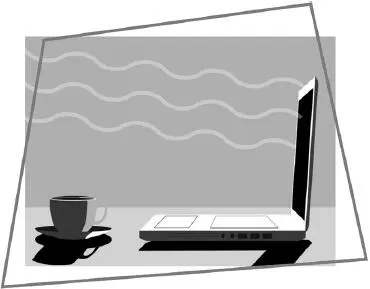
Chapter 1
Ethical, Legal, and Risk Management Considerations: Understanding the Landscape of Telebehavioral Health and Supervision
Jennifer Nivin Williamson and Daniel G. Williamson
The ACA Code of Ethics (American Counseling Association [ACA], 2014) declares the following in the introduction to Section H:
Counselors understand that the profession of counseling may no longer be limited to in-person, face-to-face interactions. Counselors actively attempt to understand the evolving nature of the profession with regard to distance counseling, technology, and social media and how such resources may be used to better serve their clients. (p. 17)
This section on distance counseling, technology, and social media was among major revisions to the ethical standards and identifies technology as a part of the profession. Counselors have an ethical obligation to understand how new technologies might be used to serve clients and to use them responsibly. The introduction to Section H goes on to caution counselors to recognize the concerns with using these technologies, especially in terms of protecting confidentiality, and to recognize the ethical and legal requirements needed to implement these resources appropriately (ACA, 2014). The primary goal of integrating technology into counseling practice is to enhance human interaction (Association for Counselor Education and Supervision Technology Interest Network, 2007). As counselors engage in technology-assisted mental health services, it is imperative that they consider ethical, legal, and risk management standards in an effort to provide competent care to clients. In instances when the process is not clearly outlined, an ethical decision-making model should be used, the law should be explored, and the appropriate stakeholders should be consulted.
Providing some form of mental health services at a distance is not a new concept. Suicide hotlines have been in existence since the 1950s (Centore & Milacci, 2008), and poet Sylvia Plath continued to connect with her Boston-based psychiatrist after she moved to England by exchanging letters in the 1960s. Although Plath’s life ultimately ended in suicide, she described the letters as a lifeline (Alexander, 2018). This illustrates both the risk and benefit of distance counseling.
In 2014, ACA recognized “the evolving nature of the profession with regard to distance counseling, technology, and social media” (p. 17). In 2016, the National Board for Certified Counselors (NBCC) recognized the impact that computers and technology have had on the counseling profession, drafted a policy regarding the provision of distance services, and developed a distance counseling credential. Multiple terms are used to describe counseling activities that partly or completely use the internet, including “online counseling/therapy, technology-assisted counseling, e-therapy, psychotechnology, behavioral telehealth, distance professional services, internet counseling, cybertherapy, and distance counseling” (Wheeler & Bertram, 2019, p. 172). Harris and Birnbaum (2015) touted the possibility of technological advances to reach tens of millions of individuals who are currently underserved.
Legal and regulatory bodies struggle to keep up with the integration of technology into the profession, as do practitioners. VandenBos and Williams (2000) reported that in a survey of American Psychological Association members, 98% affirmed that they had provided counseling services over the phone. Although the use of technology in counseling and supervision has been present for decades, the use of modern technologies remains hotly debated.
During the 2020 Coronavirus (COVID-19) crisis, technology proved to be an opportunity for maintaining continuity of care, providing emergency services, and coping with the global pandemic. Many governing bodies, including state licensure boards and the U.S. Department of Health and Human Services, temporarily relaxed Health Insurance Portability and Accountability Act of 1996 (HIPAA) regulations in an effort to allow counselors and other mental health professionals to provide mental health services during this emergency (U.S. Department of Health and Human Services, 2020). It is possible that these experiences with online counseling will further expand the use of distance counseling. In addition, counseling supervision was provided via synchronous videoconferencing platforms in universities that traditionally only used face-to-face formats.
Competency
In many situations, counselors are responsible for identifying and demonstrating competency when determining their scope of practice. There are, however, specific laws or regulations for determining minimum standards. Some state licensure boards have identified minimum training standards through continuing education credits or university training, whereas other boards have not clearly articulated expectations. It has been a challenge for regulatory entities to stay current with the rapid evolution of technology and technological practices. It is clear in all situations that counselors must always function within their areas of competence and be able to provide evidence regarding their competence and adequate training. This is especially challenging as technology is constantly changing, and best practices in technology-assisted mental health services are in their infancy. ACA (2014) notes that “counselors who engage in the use of distance counseling, technology, and/or social media develop knowledge and skills regarding related technical, ethical, and legal considerations (e.g., special certifications, additional course work)” (Standard H.1.a.).
In addition, counselors must make clients and supervisees aware of the training, limitations, and protections offered by the counselor or supervisor (American Association for Marriage and Family Therapy, 2015). The Association of Marital and Family Therapy Regulatory Boards (AMFTRB; 2016) identified a minimum of 15 hours of initial training, including the appropriateness of teletherapy, teletherapy theory and practice, modes of delivery, legal/ethical issues, handling online emergencies, best practices, and informed consent. In addition, it requires five continuing education hours every 5 years. NBCC offers a nationally recognized credential, the board certified-telemental health provider (BC-TMH), who might be useful in training and the demonstration of skills. This provides counselors an opportunity to demonstrate formal training or skill attainment as a telemental health provider (Center for Credentialing and Education, 2020).
Residency
When counselors engage in technology-assisted counseling, they should be aware of the laws and regulations in their state of practice as well as the client’s state of residence. In most situations, counselors must adhere to the laws and regulations of both states (ACA, 2014; AMFTRB, 2016; NBCC, 2016b). When clients or counselors travel out of their state of residency (physically or virtually), counselors should be aware of the state’s definition of residency, as each state defines residency differently. Some states allow a client’s residency to be defined by the client’s home address, whereas others define residency as the physical locations of the counselor and/or client at the time of service delivery (AMFTRB, 2016). Some states allow for travel, but they may define the number of days outside of the home state. In this situation, an attorney and the licensure boards for the states in question should be consulted to fully understand the legal definition of residency. Once counselors have identified the legal regulations for their region, they should document their findings as well as their activities in their counseling records (NBCC, 2016b).
Читать дальшеИнтервал:
Закладка:
Похожие книги на «Distance Counseling and Supervision»
Представляем Вашему вниманию похожие книги на «Distance Counseling and Supervision» списком для выбора. Мы отобрали схожую по названию и смыслу литературу в надежде предоставить читателям больше вариантов отыскать новые, интересные, ещё непрочитанные произведения.
Обсуждение, отзывы о книге «Distance Counseling and Supervision» и просто собственные мнения читателей. Оставьте ваши комментарии, напишите, что Вы думаете о произведении, его смысле или главных героях. Укажите что конкретно понравилось, а что нет, и почему Вы так считаете.
